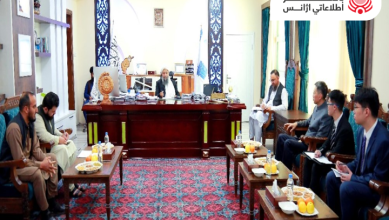
Sunday August 14, 2016
Kabul (BNA) Bomb-blasted roads, frequent blackouts, shortages of basic equipment and an untested consumer market are hardly conditions that make for natural entrepreneurial opportunities.
But three Army veterans and one civilian who all served in Afghanistan have taken on those challenges in their new venture.
Their company, Rumi Spice, buys saffron from Afghan farmers and sells it to international customers. Their business is part of a small crop of efforts to help develop Afghanistan’s resource economy. “We wanted to create something to empower everyday Afghans long after we left,” said Kimberly Jung, one of Rumi Spice’s founders, who said the company’s name was inspired by the 13th-century Persian poet. Started two years ago, Rumi Spice now sells saffron that is used by chefs in renowned restaurants like the French Laundry in California and Daniel in New York. It appeared on the shelves and website of the luxury food seller Dean& DeLuca this month.
Saffron is one of the most expensive spices in the world, costing $2,500 to $30,000 a kilogram. A staple in Indian, Moroccan and Persian cuisine, it is also a crucial ingredient in European dishes like Spanish paella and French bouillabaisse. As Americans search out the latest artisanal trends, Afghan saffron is starting to make inroads. “As overall aid money to Afghanistan has decreased, a new mind-set of entrepreneurship has taken hold,” said Ahmad Fahim Didar, the director of the new Afghan chapter of Startup Grind, a global start-up community that works with Google for Entrepreneurs. The Rumi Spice founders decided to focus on farmers because 80 percent of the Afghan population works in agriculture, according to the United States Embassy in Kabul. Still, starting a business, even a small one, is filled with challenges in Afghanistan. Much business is done based on trust or relationships rather than contracts or agreements. In their case, the founders discovered that some of the contacts they made during their military deployments were receptive to working with them.
In addition, electricity blackouts are common, which can render the dryers used in processing useless. The main national highway is both damaged by war and still a prime target of improvised explosive devices, or I.E.D.s, making travel risky. Saffron is expensive because it is difficult to grow and painstaking to harvest. Each amethyst-colored saffron crocus produces just three stigmas. The stigmas are separated by hand from the blossom and then dried into rusty-red threads. About 150 flowers are needed to produce a single gram of saffron. Afghan saffron has a reputation for being particularly flavorful — in part because of the terrain and harsh climate around Herat, where it is grown. In 2014, Keith Alaniz, an Army engineer officer who worked with regional governments in Afghanistan, approached his friend Ms. Jung, whom he had met while working for the Army Corps of Engineers after Hurricane Sandy in New York, about the idea of marketing Afghan saffron.
Ms. Jung had been an Army engineer officer who searched for roadside bombs in Afghanistan. She was then at Harvard Business School with Emily Miller, also a former Army engineer officer, who had assisted Special Operations on night raids. The company’s fourth founder, Carol Wang, had worked in Afghanistan on a World Bank-backed rural development program. One of the arguments for bringing saffron to an international market is that it could give Afghan farmers an alternative to growing opium poppies, a source of heroin. The farmers were skeptical at first, Ms. Jung said, because they had seen “people come and go with many promises.” But Ms. Miller said, “Once they started seeing we could really sell the product, the farmers started knocking on our doors.”
Rumi Spice worked with 34 farmers in 2015. The company plans to work with more than 80 farmers for this year’s harvest in October and November.
The next step was to open a processing plant. In April 2015, Rumi Spice began a Kick starter campaign and raised nearly $33,000 in less than two months. The processing plant, based in Herat, employed 75 Afghan women in 2015. The company paid their wages directly to them rather than following the more common Afghan practice of paying the male head of the household. About 300 to 400 women will be hired for the 2016 harvest. Rumi Spice was initially set up as a limited liability company. A year later, the founders switched it to a public benefit corporation. They were drawn by the idea that the company would be “required by law to report profit and impact every two years” to shareholders, Ms. Miller said. In 2016, Rumi Spice is on track to reach its projected revenue of $500,000 for the year. The founders say that it became profitable three months ago. Two of the founders, Ms. Jung and Ms. Miller, are full time and based in the United States, while the other two work with them part time. The company also has two additional full-time employees based in Chicago and Afghanistan.
Bringing investors on board was no easy feat because of concerns over continued Taliban violence. Most of the government’s budget depends on foreign aid, and the Taliban still control large swaths of the country. “It seemed dangerous and crazy to source saffron out of Afghanistan,” said Douglas Doan, the founder of Hivers and Strivers, an angel investing group that finances start-ups created by military veterans. The group waited six months to invest. Hivers and Strivers and Golden Seeds, an investing group that backs start-ups created by women, have invested a combined $272,000. NYT
To be continued




